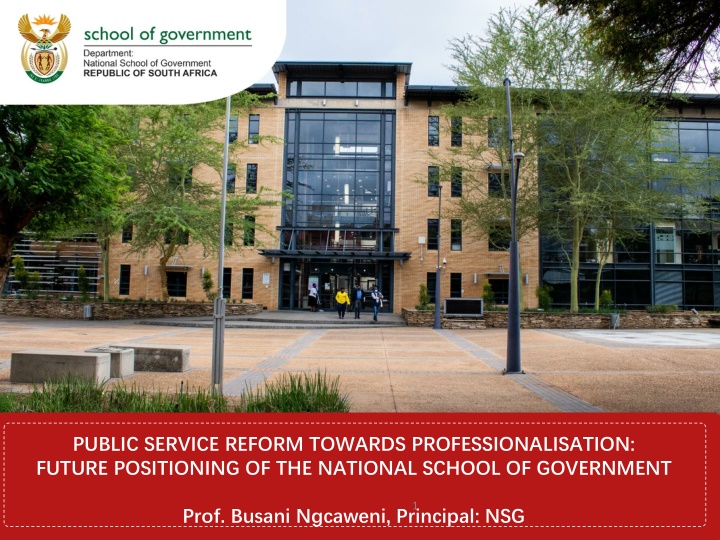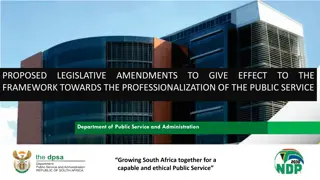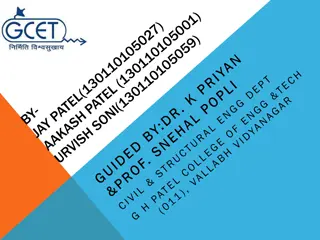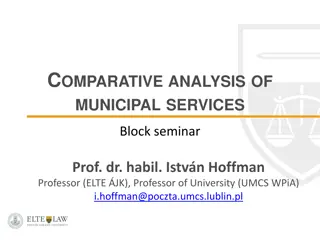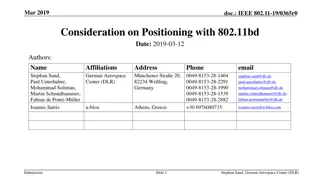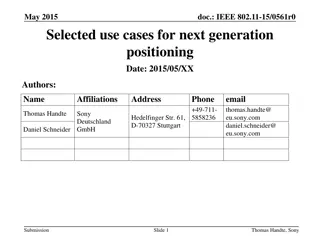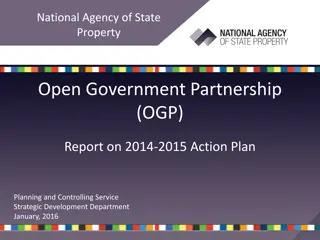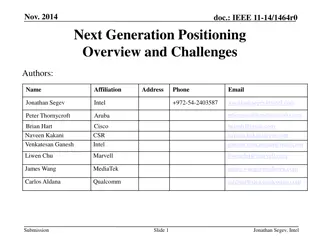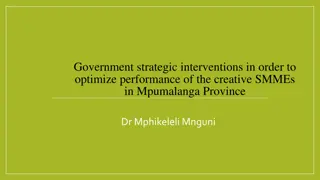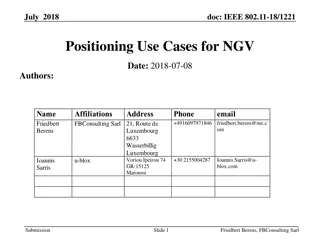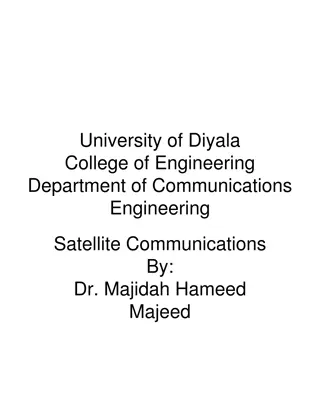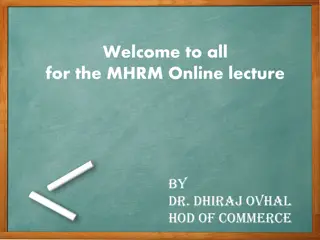Enhancing Public Service Professionalization Through National School of Government Positioning
This presentation outlines the strategic response to public service reform towards professionalization by positioning the National School of Government (NSG) to build state capacity, address deficiencies in various departments, and strengthen governance for effective service delivery in South Africa. It highlights the challenges, including a lack of capacity in SOEs and local government, and emphasizes the need for rebuilding institutional capacity and trust. President Cyril Ramaphosa's commitment to combating corruption and enhancing accountability is also emphasized as key to rebuilding state capacity and capability.
Download Presentation

Please find below an Image/Link to download the presentation.
The content on the website is provided AS IS for your information and personal use only. It may not be sold, licensed, or shared on other websites without obtaining consent from the author.If you encounter any issues during the download, it is possible that the publisher has removed the file from their server.
You are allowed to download the files provided on this website for personal or commercial use, subject to the condition that they are used lawfully. All files are the property of their respective owners.
The content on the website is provided AS IS for your information and personal use only. It may not be sold, licensed, or shared on other websites without obtaining consent from the author.
E N D
Presentation Transcript
PUBLIC SERVICE REFORM TOWARDS PROFESSIONALISATION: FUTURE POSITIONING OF THE NATIONAL SCHOOL OF GOVERNMENT Learn Grow Serve 1 Prof. Busani Ngcaweni, Principal: NSG
PURPOSE AND OUTLINE OF PRESENTATION PURPOSE: To present the conceptual outline for the future positioning of the National School of Government (the NSG) as a strategic response to the public service reform towards professionalisation. OUTLINE: Building State Capacity Benchmarking of Schools of Government Future Positioning of the National School of Government Learn Grow Serve
INTRODUCTION: STATE EFFECTIVENESS Enabling legal environment Governance and rule of law State security Trust, Social Compact & Citizen rights Infrastructure provision Sound public finance & economy Environment and Assets State Resilience State Capacity Source: The Institute for State Effectiveness Learn Serve Grow 3
PROBLEM STATEMENT The sufficient capability at a rate, pace and scale at which a dynamic developmental state requires. state is not building State capacity and capability have weakened over time, varies widely, with major deficiencies in many departments. South Africa is known to have produced good policies, however, the lack of contextual environment upon which these must be implemented coupled with lack of capacity and capability makes it difficult to deliver on those policies Public Service Commission capacity and The inadequate response to the developmental challenges of unemployment, poverty, economic social justice transformation. result of this is an Human capacity in the SOE environment is lacking at oversight, governance board, and executive management levels. There is also a lack of technical capacity to engage the SOEs during the drafting of shareholder compacts; inadequate capacity by the state to assess the strategic planning of SOEs and therefore its capacity to monitor SOE performance - Presidential Review Committee on SOEs inequality, growth, and For the 2020/21 financial year, the Auditor-General South Africa (AGSA) audited 15 SOEs with a total budget of approximately R100 billion for the year, but the finances of most of them are in a shambles . The current state of local government appears to have reached a crisis point. In general, many capacity building initiatives appear to not have materially impacted local government s capability to deliver services and fulfil its mandate to residents National Treasury Diagnostic Review Learn Serve Grow 4
STATE CAPACITY As a nation, we have made extraordinary progress in the fight against state capture and corruption. But there is much work that lies ahead, to rebuild our institutions and the capacity of the state, to ensure accountability, to restore trust and confidence, and to rekindle our hope in a better future for all - President Cyril Ramaphosa response to the Commission of Inquiry into State Capture Report Key towards building state capacity and capability include the creation of a permanent anti-corruption commission and a public procurement anticorruption agency; further strengthen the current anti-corruption capabilities; establishing a professional body for public procurement officials; and professionalisation of the public administration One of the main findings made in the Ten-Year Review of the NPC was that the economy was not only failing to grow at the rate required for the objectives of NDP to materialise, but the economy was also not structured to serve the interests of all South Africans, resulting in poverty and inequality remaining extremely high and persistent. We need to embark on a course of action to get the country back on the developmental path envisaged by the Plan and place more focus on resolving key issues related to the provision of energy, addressing infrastructure backlogs including transport and freight, building state capacity, and addressing the apartheid spatial legacies, Prof Tinyiko Maluleke, Deputy Chairperson of the Commission. Learn Serve Grow 5
IMPLEMENTING THE PROFESSIONALISATION FRAMEWORK Career Progression, Succession Planning & Management of Career Incidence of Heads of Department Continuing Learning & Professional Development Planning & Performance Management Pillar 3 Induction & Recruitment & Selection Onboarding Pillar 1 Pillar 2 Pillar 4 Pillar 5 Learn Serve Grow
COALITION GOVERNMENT AND STATE CAPACITY The instability that is experienced at the local sphere of government is affecting the nation- building project. If it is not responded to coherently, it will render unworkable and unable to deliver on its mandate. the state The specific socio-political culture and institutional conditions in these (benchmarked) countries make it possible for coalitions to guarantee continuity of socioeconomic development and service delivery, regardless of the dynamics in politics. professionalisation of public Further, administration and the insulation of civil servants or public servants from political upheavals prevents these governments from being dysfunctional. the Learn Serve Grow 7
INTEGRATED PLANNING Ensure that national governance, social, spatial, economic and environmental development priorities are pursued in the development planning, resourcing and implementation activities undertaken in terms of the Act by the three spheres of government, public entities and the social partners IGR and District Development Model (DDM) planning and implementation requires a new cadre of public servant Institutionalise and synthesise the long, medium and short-term national development planning, resourcing and implementation components of the national development planning system provide for developmental principles and norms and standards to guide and inform the development planning, resourcing and implementation activities undertaken in terms of the Act by the three spheres of government, the social partners and public entities Framework for spatial planning and land use management Confirm the role of the DPME in the national development planning system Integrated introduced Planning by Bill the DPME Inform and guide the preparation, adoption, implementation and review of development planning policy, legislation and resourcing in all three spheres of government. Learn Serve Grow 8
A MORE CO-ORDINATED APPROACH TOWARDS BUILDING STATE CAPACITY Requires strategic direction, integrated planning, management and greater co-ordination with all stakeholders and sectors to build state capacity. Professionalisation Framework forms the basis for setting norms and standards for public sector education, training and development. Enabling the delivery through partnerships and collaboration Diagnosing state capacity needs and sector planning Designing capacity building interventions for delivery Setting national policy, norms and standards Quality assuring interventions Monitoring the impact and outcomes Learn Serve Grow 9
SCHOOLS OF GOVERNMENT Schools of government are uniquely placed to enhance the capacity of public servants to meet the leadership, policy and delivery challenges they face and can play this role both directly, through their learning and training programmes, and indirectly, by encouraging a learning culture that contributes to civil service effectiveness and efficiency - OECD. Schools of government must adapt to meet new demands and changing mandates. As such, they must be more reachable and strategic, continuously identify new strategies, and apply new teaching and learning methods, in a changed context OECD Schools are well placed to identify and address skill gaps as well as to foresee future skill needs and capacity-building requirements. The place of Schools as leaders in the overall functioning of administrations is understated and emerging, and many governments are recognising this by placing new or added emphasis on Schools. Learn Serve Grow 10
LEADERSHIP ROLE OF SCHOOLS OF GOVERNMENT Leading in driving the skills and knowledge agenda and defining the structure and content of learning systems Leading in the overall functioning of administrations: why is the role understated and emerging? Identifying and closing skills gaps and forecasting future skills needs Enhancing leadership in public administrations Driving the skills agenda in a modern public service Learn Serve Grow 11
LEGISLATION MANDATES US TO FULFIL THE FOLLOWING Enhance the quality, extent and impact of human resource capacity in institutions Provide compulsory education and training Foster collaboration Compulsory pre-requisites for employment or progression Issue qualifications Sustainable Funding Learn Serve Grow 12
FUTURE POSITIONING OF THE NATIONAL SCHOOL OF GOVERNMENT SKILLS TRANSFER OF LEARNING LEARNING PATHWAYS QUALIFICATIONS & SHORT PROGRAMMES KNOWLEDGE EXCHANGE DEVELOPMENT PROFESSIONALISATION SKILLS AUDITS & RESEARCH ADVISORY, CHANGE MANAGEMENT & INSTITUTIONAL SUPPORT UNLOCKING OPPORTUNITIES Learn Serve Grow 13
FUTURE POSITIONING OF THE NSG Manage and co-ordinate a network of training by remaining a core institution and having national footprint with other providers (Direct, Influence, Refer) HIGH IMPACT GAME-CHANGING PROGRAMMES: Digital Skills Innovation and Design Thinking Execution Diligence & Project Management Strategic Procurement and Supply Chain Management Scenario Planning & Futures Thinking Managing Finances Stakeholders in a Complex Environment Economic Governance Ethical Governance Change Management & Transformation Just Transition and the Environment Art of Facilitating Community Engagements Work with DPSA in setting the agenda, norms and standards for ETD Work with PSETA to set requirements for training providers in meeting minimum facilitation/ training delivery standards. Training providers should also register for key programmes before they deliver to the public sector. Work with DPME to evaluate and measure impact on state capacity. Offer open courses (e.g. Ethics, Know and Live our Constitution, Anti-Discrimination) to citizens, private sector, NGOs and students in PSET space and those individuals who wish to prepare themselves for entry into the public sector. Sustainable funding and exploring international co- operation sources. Learn Serve Grow 14
FUTURE POSITIONING OF THE NATIONAL SCHOOL OF GOVERNMENT Executive Education Compulsory International programmes, Conferences Qualifications future/interested public servants and elected officials Knowledge & Innovation Hub NSG Advisory, Change Management & Institutional Support current public servants and elected officials Learn Serve Grow 15
HOW WE WILL DELIVER Face-to-face learning (Physical & Virtual) Asynchronous open-distance eLearning Blended learning Just-in-time learning Customised learning Microlearning Continuous professional development Peer Interaction & Advocacy Immersive learning Learn Serve Grow 16
KEY PROPOSALS Establishing a fully-fledged examination centre as well as a Recognition of Prior Learning (RPL) assessment centre in the enrolment and issuing of qualifications and conducting of tests/ examinations. Establishing a digital and innovation hub to enable public servants to ideate, prototype, pilot and replicate innovations for efficient service delivery. Such a hub could assist in the digital creation of learning content, e.g. videos. In-house subject matter experts in the areas of public policy, economic sciences, data and innovation, big data management, foresight and scenario planning, and engineering, amongst others. cohort of lecturing and consulting staff who are focused on high impact programmes and complementing the current model of using a panel of experts in the design and delivery of courses and programmes. Also need to appoint a core An all-encompassing campus for the NSG - environment for learning, conferencing, teambuilding, holding seminars, workshops, retreats, meetings, research centre, library, activity-based spaces to ideate, test, learn, and discover. The hybrid funding model is still preferred to enable and provide options for the School to generate revenue from sources other than direct education and training through the Training Trading Account. However, expenditure of the School is fully funded through the Vote, including compensation of all employees, capital and operating expenditure. Public sector institutions must set aside a percentage (at least 50%) of annual training budgets for compulsory education and training to be offered by the National School of Government and recognised partners/ providers. This must include delivering no-fee open distance eLearning courses to scale across the public sector. Learn Serve Grow 17
KEY PROPOSALS Set norms and standards for education, training and development in line with the Professionalisation Framework (working with the DPSA and COGTA) Determine needs for building state capacity (working with the DPME and NPC) Monitor the implementation of budget for compulsory education and training (50% of annual training budget) of public institutions (working with the DPSA, COGTA and DHET) Monitor and evaluate the impact of education, training and development in building state capacity (working with the PSC and DPME) Heightening state capacity building issues through governance structures (President s Coordinating Council; HRD Council of South Africa; GSCID Cluster; Provincial and Municipal Intergovernmental Forums; HRD Forum) Establishment of a Curriculum and Quality Assurance Advisory Board to provide strategic advice and direction to the National School of Government. Learn Serve Grow 18
ROADMAP TOWARDS FUTURE POSITIONING OF THE NATIONAL SCHOOL OF GOVERNMENT FUTURE POSITIONING OF THE NSG NSG CAMPUS Cabinet memorandum Finalise plans for campus NSG FUNDING National Treasury engagement STAKEHOLDER ENGAGEMENT TEN-YEAR ANNIVERSARY STATE CAPACITY AND CAPABILITY Marketing, Communication and Events Partnerships, collaboration and buy-in Strategic and co-ordinated approach Learn Serve Grow
